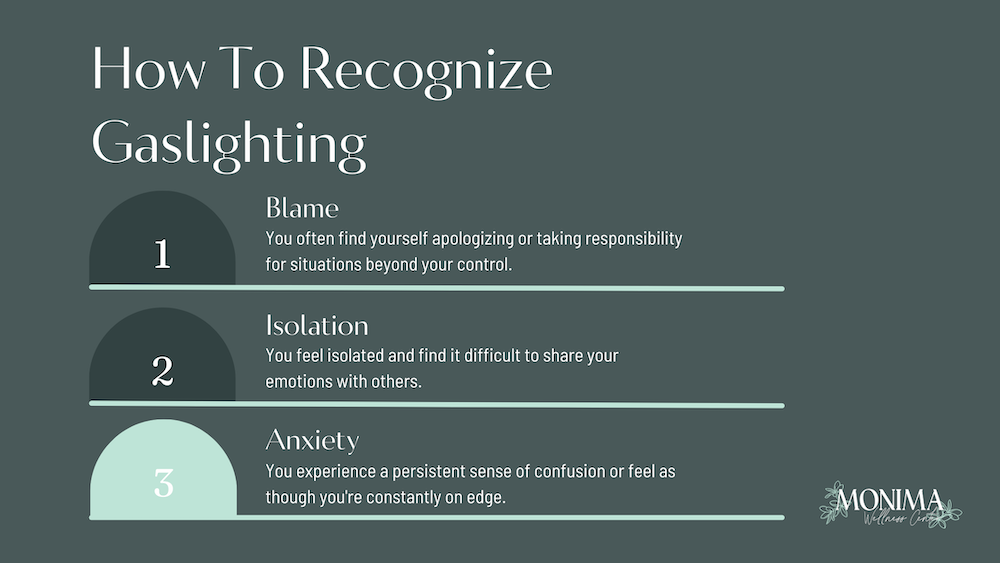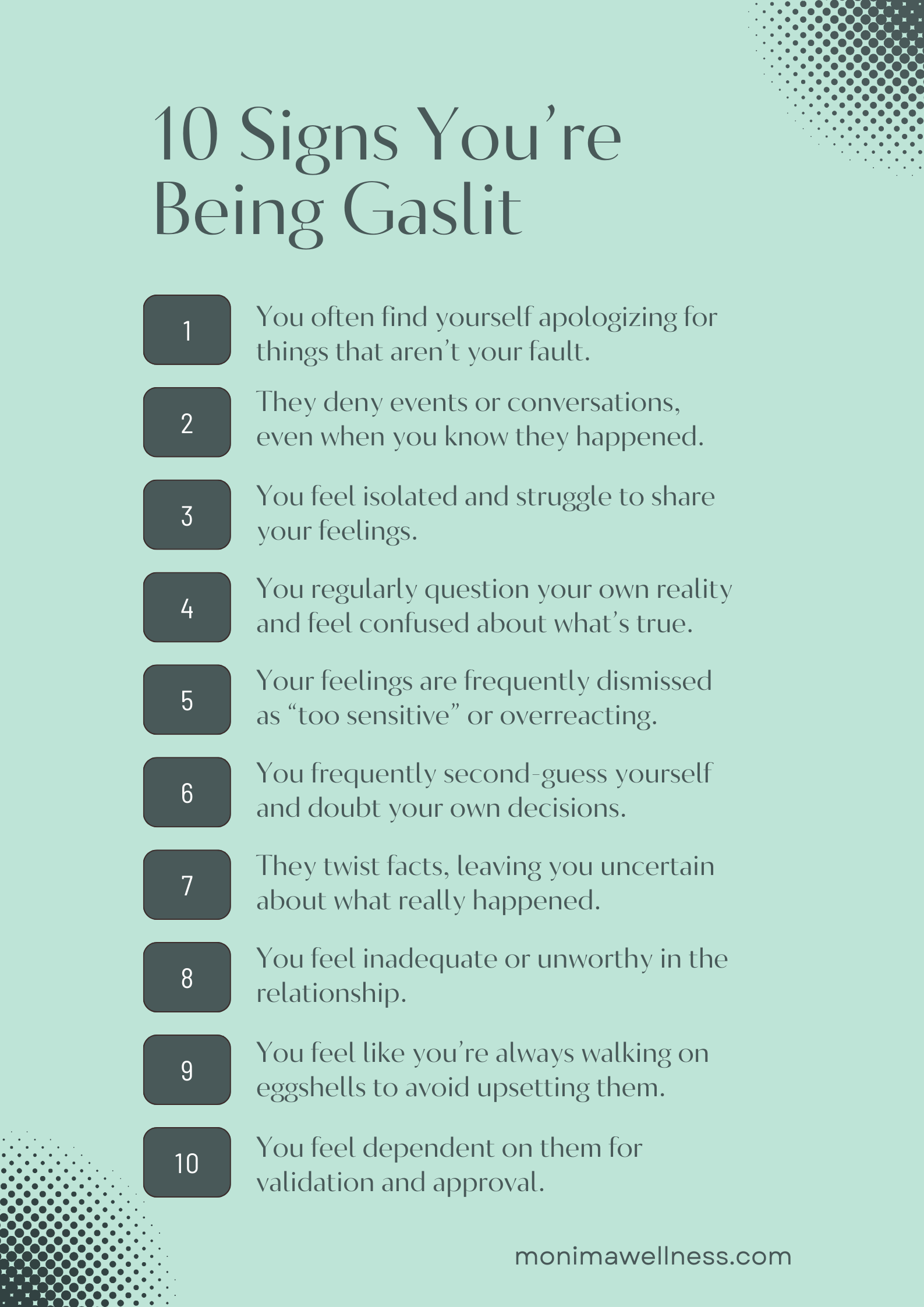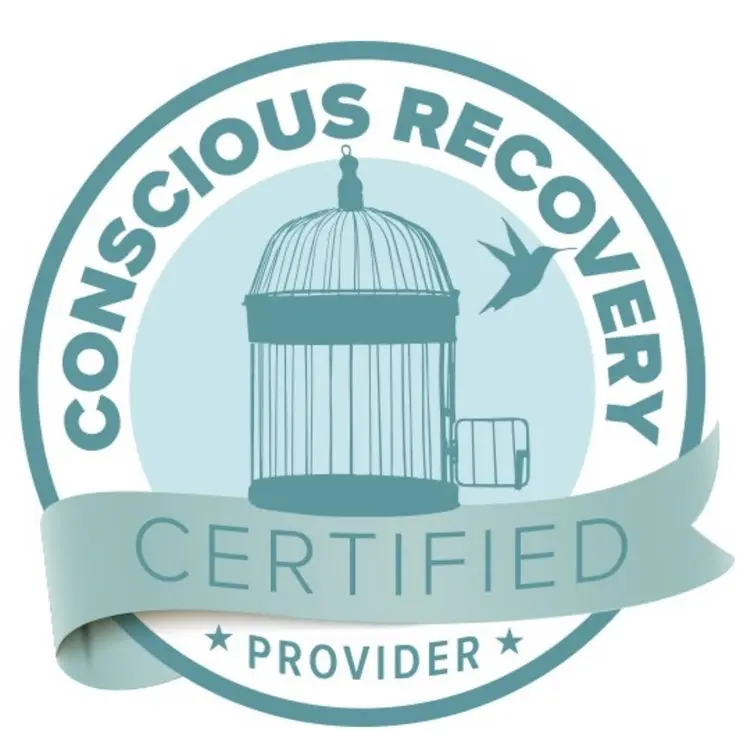Have you ever found yourself constantly second-guessing your own thoughts, feelings, or even memories? If so, you may be experiencing gaslighting—a subtle yet dangerous form of emotional abuse that manipulates your sense of reality. Gaslighting can happen in any relationship, whether it’s romantic, familial, or professional, and its long-term impact on mental health can be devastating.
At Monima Wellness Center, our team of trauma-informed clinicians has extensive experience helping women recover from gaslighting and other forms of emotional abuse through our specialized programs in San Diego. We understand the complex psychological impacts of manipulation and provide evidence-based treatment approaches to help trauma survivors rebuild their sense of reality and self-worth.

In this article, we’ll explore ten common examples of gaslighting and highlight the key phrases often used by gaslighters to make you doubt yourself. Recognizing these signs can empower you to take control and seek the support you need.
Are you struggling with gaslighting or emotional abuse? You’re not alone. Contact Monima Wellness Center and talk to a mental health professional today.
What Is Gaslighting?
Have you ever found yourself constantly second-guessing your own thoughts, feelings, or even memories? If so, you may be experiencing gaslighting—a subtle yet dangerous form of emotional abuse that manipulates your sense of reality. Gaslighting can happen in any relationship, whether it’s romantic, familial, or professional, and its long-term impact on mental health can be devastating.
In this article, we’ll explore common examples of gaslighting and highlight the key phrases often used by gaslighters to make you doubt yourself. Recognizing these signs can empower you to take control and seek the support you need.

Gaslighting is a manipulative tactic where someone makes you question your reality, memories, or feelings. It’s often done gradually, causing the victim to feel confused, anxious, and dependent on the gaslighter for their sense of reality. This form of emotional abuse can have severe effects on mental health, leading to conditions like depression, anxiety, and even PTSD and CPTSD.
The term “gaslighting” originates from the 1944 film “Gaslight,” where a husband systematically manipulates his wife into believing she’s losing her sanity. This psychological manipulation technique has since been extensively studied by researchers and mental health professionals.
According to recent research, gaslighting represents a specific form of psychological manipulation characterized by persistent reality distortion aimed at undermining the victim’s confidence in their own perceptions and memories. The study found that gaslighting behaviors create significant psychological distress and can lead to long-term mental health consequences.
The Psychology Behind Gaslighting
Research in clinical psychology demonstrates that gaslighting operates through several key mechanisms:
- Reality Distortion: Gaslighters systematically challenge the victim’s perception of events, creating confusion about what actually occurred
- Memory Manipulation: By consistently denying or altering facts, perpetrators cause victims to doubt their own recollections
- Emotional Invalidation: Victims’ feelings and reactions are consistently dismissed as inappropriate or exaggerated
- Dependency Creation: Over time, victims become increasingly reliant on the gaslighter’s version of reality
Studies published in the Journal of Family Violence indicate that gaslighting tactics often co-occur with other forms of intimate partner violence, creating complex patterns of psychological control that can be particularly difficult to recognize and escape.
Neurobiological Impact of Gaslighting
Recent neuroscience research reveals that chronic gaslighting can actually alter brain functioning. When individuals are repeatedly told their perceptions are wrong, it activates the brain’s threat detection systems, leading to chronic stress responses. This prolonged activation can result in:
- Changes in memory consolidation and retrieval
- Heightened anxiety and hypervigilance
- Disrupted attachment patterns and trust mechanisms
- Altered self-concept and identity formation
These neurobiological changes help explain why victims of gaslighting often experience symptoms similar to trauma responses, including dissociation, emotional dysregulation, and difficulty trusting their own judgment.
If you’re feeling lost or unsure of your reality, you’re not alone. Monima Wellness offers supportive therapy for women who’ve experienced gaslighting and emotional abuse.
10 Common Gaslighting Tactics
As mentioned, gaslighting is a psychological manipulation tactic where someone distorts the truth, causing the victim to doubt their own perceptions, memories, or feelings. Below are ten common gaslighting examples that aim to undermine your sense of self and leave you questioning your reality.
Research published in BMC Psychiatry identifies several core behavioral patterns that characterize gaslighting relationships. Understanding these patterns can help individuals recognize when they’re experiencing this form of emotional abuse. The following examples illustrate the most commonly documented gaslighting tactics used to manipulate and control victims.

1. “That Never Happened”
One of the most common gaslighting tactics is flat-out denying something that did happen. When someone repeatedly says, “That never happened,” even though you remember it clearly, you second-guess your memory. Over time, this can leave you feeling unsure of what’s real and what’s not.
2. “You’re Too Sensitive”
Gaslighters often brush off your feelings by telling you you’re “too sensitive” or “overreacting.” This makes you doubt whether your emotional reactions are valid, and you might start to wonder if you really are being unreasonable. Spoiler alert: you’re not. It’s a tactic to make you feel small.
3. “You’re Imagining Things”
This is a classic way to make you question your perception of reality. When you bring up a concern, they dismiss it with, “You’re imagining things.” This can make you feel paranoid or even irrational as if you’re the one who’s wrong for even bringing it up. It chips away at your confidence in your own judgment.
4. “Everyone Else Thinks You’re Crazy”
An individual who is gaslighting you might try to make you feel isolated by claiming that other people agree with them. They might say something like, “All your friends think you’re crazy too.” This is meant to make you feel alone, with no one else to trust except them—even though they’re the person causing the problem.
5. “You’re Overthinking It”
Have you ever expressed a concern only to be told, “You’re overthinking it”? This is a tactic to make you second-guess your gut instincts. It makes you feel like you’re blowing things out of proportion, even when your concerns are valid.
6. Withholding Information or Refusing to Engage
Gaslighters sometimes refuse to engage in conversations about important issues or withhold information. When they say things like, “I don’t know what you’re talking about,” they’re avoiding accountability. This leaves you feeling confused and unsure about the situation because they’ve dodged the conversation altogether.
7. “It Was Just a Joke”
Ever had someone say something hurtful and then brush it off with, “It was just a joke”? This is a way for gaslighters to make you feel like you’re overreacting. It makes you question whether your feelings are valid, even when the comment was clearly inappropriate or mean-spirited.
8. Shifting Blame
Instead of owning up to their mistakes, gaslighters will often turn the tables and blame you. They’ll say things like, “This is all your fault,” or “You made me act this way,” making you feel responsible for their behavior. This tactic can leave you feeling guilty for things that aren’t even your fault.
9. Contradictory Statements
A gaslighter might say one thing one day and completely deny it the next. For example, they could claim, “I never said that,” when you know they did. These mixed messages create confusion and make you question your own memory and understanding of the situation.
10. “If You Really Cared About Me, You Wouldn’t Even Think That”
This phrase uses your own love and care against you. The gaslighter might say, “If you really cared about me, you wouldn’t even think that,” making you feel guilty for expressing concerns. This emotional manipulation makes you question your own feelings and discourages you from standing up for yourself.
How to Recognize Gaslighting
This phrase uses your own love and care against you. The gaslighter might say, “If you really cared about me, you wouldn’t even think that,” making you feel guilty for expressing concerns. This emotional manipulation makes you question your own feelings and discourages you from standing up for yourself.

The Psychological Profile of Gaslighting Victims
Research in clinical psychology has identified specific psychological patterns that emerge in individuals experiencing gaslighting. According to studies published in academic journals on emotional abuse, victims often develop what researchers term “reality monitoring deficits”—a decreased confidence in their ability to distinguish between internal thoughts and external events.
Long-Term Mental Health Consequences
Prolonged exposure to gaslighting can result in several serious mental health conditions:
- Complex Trauma: Chronic gaslighting can lead to complex trauma and Complex PTSD, particularly when it occurs in close relationships
- Attachment Disruption: Victims may develop insecure attachment patterns that affect future relationships
- Identity Confusion: Constant reality distortion can lead to fundamental uncertainty about one’s own identity and worth
- Emotional Dysregulation: Difficulty managing emotions and stress responses becomes common
Some research demonstrates that gaslighting victims frequently require specialized trauma treatment to address both the immediate psychological impacts and the longer-term effects on their sense of self and reality.
The Connection to Attachment Styles
Studies in developmental psychology show that individuals with certain attachment styles may be more vulnerable to gaslighting relationships. Those with anxious attachment patterns, often developed in childhood, may be particularly susceptible to manipulation tactics that exploit their fear of abandonment.
Understanding your attachment style can be an important step in recognizing unhealthy relationship patterns. Consider taking our attachment style quiz to better understand how your early experiences may influence your current relationships.
Common signs you’re being gaslit:
- You frequently apologize or feel responsible for things beyond your control.
- You feel isolated and unable to talk about your feelings with others.
- You feel like you’re “losing it” or constantly walking on eggshells.
If you recognize these signs, Monima Wellness can help you regain clarity and rebuild your sense of self. Contact us today to begin your journey toward healing and reclaiming your mental well-being.
What To Do If You’re Being Gaslit
When dealing with gaslighting, it’s important to respond carefully and thoughtfully to protect your mental well-being. Here are a few tips:

- Document incidents: Keep a record of specific instances when you feel gaslighted to ground yourself in reality.
- Don’t argue with the gaslighter: Arguing can be futile, as the gaslighting individual will often deny or twist facts.
- Build a support system: Talk to trusted friends, family, or a therapist who can help you validate your experiences.
- Trust yourself: Rely on your instincts, even if you’re being told otherwise.
Evidence-Based Recovery Strategies
Research in trauma psychology has identified several therapeutic approaches that are particularly effective for gaslighting survivors:
- Attachment-Based Therapy: Attachment-based therapy helps individuals understand how early relationships may have made them vulnerable to manipulation and works to develop secure attachment patterns
- Internal Family Systems (IFS): IFS therapy can be particularly helpful for gaslighting survivors, as it helps individuals reconnect with their authentic self and develop internal validation
- Trauma-Informed Care: Specialized trauma treatment addresses the neurobiological impacts of chronic gaslighting and helps restore confidence in one’s own perceptions
The Importance of Professional Support
Most experts agree that recovery from severe emotional abuse and gaslighting often requires professional intervention. The reality distortion experienced in gaslighting relationships can be so profound that individuals need external support to distinguish between manipulated perceptions and accurate reality.
Professional therapy provides:
- External validation of your experiences
- Tools for rebuilding self-trust and confidence
- Strategies for recognizing and avoiding future manipulation
- Support for addressing any co-occurring mental health conditions
Need help overcoming emotional abuse and gaslighting? Reach out to Monima Wellness, a trusted women’s trauma treatment center in San Diego, and start healing with the support of compassionate, expert care. Contact us today or let us verify your insurance coverage to begin healing and reclaim your power.
Gaslighting in Different Settings
While gaslighting is often discussed in the context of romantic relationships, it can occur in many different environments. Whether it’s at work, in friendships, or even within families, the impact can be just as damaging.
Gaslighting occurs across multiple relationship contexts, with each setting presenting unique challenges for recognition and intervention. Understanding these different manifestations helps individuals identify manipulation regardless of where it occurs.

Let’s explore how gaslighting shows up in different areas of life:
1. Gaslighting at Work
In the workplace, gaslighting can take the form of manipulative behavior from supervisors or coworkers. For example, a manager might deny ever giving specific instructions, leaving you questioning your memory and competence.
If your boss repeatedly says, “I never asked you to do that,” despite clear evidence to the contrary, you may start doubting your ability to do your job. This kind of manipulation can affect your self-esteem and make you feel incompetent, even when you’re doing your best.
2. Gaslighting in Friendships
Friendships can also be a breeding ground for gaslighting. A gaslighting friend might dismiss your feelings by saying things like, “You’re overreacting” or “You’re too dramatic,” whenever you bring up an issue.
Over time, you may start to question whether your emotional responses are valid or if you’re being unreasonable. This can create a toxic dynamic where the friendship feels one-sided, leaving you feeling invalidated and unsupported.
3. Gaslighting in Families
Gaslighting can also happen within families, where the emotional bonds can make it even harder to recognize. A family member might deny events from your childhood, saying, “You’re remembering it wrong,” or claim that certain painful experiences never happened.
This can lead you to doubt your own memories and question your perception of the past. When it’s coming from someone close to you, like a parent or sibling, this manipulation can be especially damaging, as it undermines your sense of identity and history.
4. Gaslighting in Romantic Relationships
Of course, gaslighting is most commonly associated with romantic relationships. A partner might frequently deny things they’ve said or done, twist the truth, or blame you for their actions. For instance, they might say, “You’re imagining things” or “That never happened,” making you question your own reality.
Over time, this can erode your confidence, leaving you dependent on the gaslighter for validation.
Reclaim Your Peace with Monima Wellness
Gaslighting can distort your sense of reality, self-worth, and relationships. If any of these examples resonate, take the first step toward healing. At Monima Wellness, we help women break free from emotional manipulation, rebuild their confidence, and find peace through personalized therapy and holistic care.

Don’t let emotional abuse define your path—reach out to Monima Wellness today and start your journey to healing.
References
1. Klein, W., Li, S., & Wood, S. (2023). A qualitative analysis of gaslighting in romantic relationships. Personal Relationships, 30(4), 1316-1340. https://doi.org/10.1111/pere.12510
2. March, E., Kay, C.S., Dinić, B.M. et al. “It’s All in Your Head”: Personality Traits and Gaslighting Tactics in Intimate Relationships. J Fam Viol (2023). https://doi.org/10.1007/s10896-023-00582-y
3. Bellomare, M., Giuseppe Genova, V., & Miano, P. (2024). Gaslighting Exposure During Emerging Adulthood: Personality Traits and Vulnerability Paths. International journal of psychological research, 17(1), 29–39. https://doi.org/10.21500/20112084.6306
4. Sarkis, S. (2022). How gaslighting manipulates reality. Scientific American. Retrieved from https://www.scientificamerican.com/article/how-gaslighting-manipulates-reality/
5. Gama, C.M.F., Portugal, L.C.L., Gonçalves, R.M. et al. The invisible scars of emotional abuse: a common and highly harmful form of childhood maltreatment. BMC Psychiatry 21, 156 (2021). https://doi.org/10.1186/s12888-021-03134-0
6. Darke, L., Paterson, H., Dhillon, H., & van Golde, C. (2025). Defining gaslighting in intimate partner violence: Insights from victim survivors and support service providers.Psychology, Public Policy, and Law. Advance online publication. https://doi.org/10.1037/law0000461



